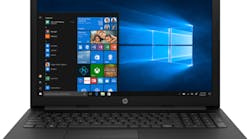HP Inc.-laptop maker Inventec Corp. said it will to shift production of notebooks for the U.S. market out of China within months, adding to the tech industry’s exodus as the world’s two largest economies escalate their trade war.
Inventec will move its entire American-bound laptop operation to its home base of Taiwan, President Maurice Wu said, the biggest migration since Donald Trump declared tariffs on $300 billion of imports will kick in next month. It wants to complete that wholesale transition within two to three months, he told investors on a post-earnings call Tuesday. Wu’s company assembles Apple Inc.’s AirPods and produces notebook computers for HP, which accounts for an estimated third of its revenue.
From Inventec to Apple-assembler Hon Hai Precision Industry Co., Taiwanese companies that make most of the world’s electronics are reconsidering their reliance on the world’s No. 2 economy as Washington-Beijing tensions simmer. Rising tariffs on Chinese-made products threaten to wipe out their margins and up-end a well-oiled, decades-old supply chain. Microsoft Corp., Amazon.com Inc., Sony Corp. and Nintendo Co. are said to be among those now weighing their options away from the line of fire, such as Southeast Asia and India. Alphabet Inc.’s Google has already shifted much of its production of U.S.-bound motherboards to Taiwan, Bloomberg News has reported..
“The trade war is very painful for us,” Wu said, concluding a call during which executives shared how production shifts have hurt the company’s efficiency and margins.
Inventec’s shift marks one of the most dramatic relocations since Trump announced his decision to slap 10% tariffs on $300 billion of Chinese imports -- including consumer gadgets from smartphones to notebooks -- starting in September. Spurred on by clients, which include household names like Dell Technologies Inc. and Nintendo, many Taiwanese contract manufacturers are now drawing up contingency plans, shifting select assembly operations or exploring alternative venues.
On August 13, Compal Electronics Inc. CEO Martin Wong said his company, a rival to Inventec, has also shifted some notebook lines to Taiwan and was considering investing more in Vietnam should tariff-conflicts persist. Quanta Computer Inc. Chairman Barry Lam told reporters Tuesday his company is definitely re-locating some business to Southeast Asia, though he didn’t mention a timeframe. CFO Elton Yang said Quanta will for now aim to satisfy customers’ demands for production outside of China with their Taiwan facilities.
U.S. companies, long accustomed to using China as the world’s workshop, are looking to get out of the line of fire as tensions run high and Beijing shows a willingness to clamp down on foreign firms within its own borders. It’s a shift that may herald a broader, long-term trend as Beijing and Washington continue to spar over everything from market access to trade.
The trade war threatens to disrupt a complex global supply chain involving many countries beyond just China and the U.S. Many components that go into devices aren’t made in the U.S., despite being designed there. A phone chip designed by Apple may come out of a factory in Taiwan, then be packaged (a process that prepares it for integration into a circuit) somewhere else, before being shipped to China for assembly into an iPhone.
Still, few major manufacturers have moved output in truly significant amounts and China’s status as the world’s production base for electronics is unlikely to diminish anytime soon. Foxconn Technology Group has said it has enough capacity to make all iPhones bound for the U.S. outside of China if necessary, although Apple has so far not asked for such a shift.
By Debby Wu and Cindy Wang



